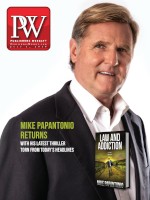In Whose Story Is This? Old Conflicts, New Chapters (Haymarket, Sept.), progressive cultural critic Solnit examines shifting social power in the U.S.
What are the old conflicts being referenced in the book’s title, and how have these conflicts changed recently?
What we used to call the dominant [cultural] narrative addressed gender from a male point of view, race from a white point of view, the invasion of North America from the perspective of the invaders rather than the indigenous, sexuality from a heterosexual point of view. The past decades have seen the rise in prominence of other voices.
I was very interested in what you said about incrementalism and about how activists often labor for years in service of watershed moments. How have feminists been laying the groundwork for #MeToo?
Revolutions are often seen as beginnings when they are usually culminations. An earthquake happens after decades or centuries of pressure builds up; a revolution happens when the pressure of old oppression and the possibilities held out by new visions suddenly shatter the status quo. Harvey Weinstein, Roger Ailes, Bill Cosby, Larry Nassar initially got away with what they did because many others in power—the media, the legal system, the communities in which they operated—did not choose to hear the victims. What changed? I believe that it was the steady progress of feminism, including the gradual arrival into positions of power—editors, producers, judges, administrators—of people who valued women and regarded our voices as worth listening to. The effective work done beforehand by feminists in addressing the epidemic of rape educated the public about all the forms of rape and coercion that weren’t the man jumping out of the alley with a knife. We haven’t had a perfect and comprehensive feminist revolution, but we have more tools and more freedom to use them. We have more arenas in which people on the other side of the old stories—victims of police brutality, of racial profiling, of misogyny and homophobia and transphobia—can be heard and make the case for justice.
How would you characterize the significance of Christine Blasey Ford’s testimony at the Brett Kavanaugh confirmation hearings? How do you imagine the repercussions of that testimony playing out in the years to come?
One thing I address in Whose Story Is This? is indirect consequences. Rosa Parks was an inspiration for Swedish climate activist Greta Thunberg; the Standing Rock movement against the Dakota Access Pipeline inspired Alexandria Ocasio-Cortez to run for office. Christine Blasey Ford didn’t torpedo Brett Kavanaugh’s nomination, just as Anita Hill didn’t cancel Clarence Thomas’s. But they did many other indirect things. They changed forever how these men will be seen, demonstrated their lack of probity and principle. They encouraged other victims to come forward. They demonstrated the Republican Party’s lack of concern for women’s rights.



 Volume 266
Issue 26
07/01/2019
Volume 266
Issue 26
07/01/2019





